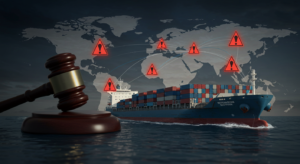Introduction to Sanctioned Countries
Sanctioned countries are nations that face restrictions imposed by other countries or international organizations, aimed at influencing their behavior or punishing them for various offenses. These sanctions can manifest in different forms, such as trade restrictions, financial limitations, or travel bans, and serve multiple purposes in the realm of international relations. The overarching goal is often to promote peace, security, and adherence to international norms and laws.
The reasons behind the imposition of sanctions can vary significantly. Political motivations are common, particularly in response to aggressive actions taken by a government against its own citizens or other nations. For instance, regimes that engage in military aggression or destabilize their regions frequently find themselves subjected to sanctions. Similarly, human rights violations—such as systematic oppression, arbitrary detentions, or suppression of freedom of speech—can trigger international condemnation and subsequent sanctions. Moreover, countries involved in illegal activities, including terrorism financing or drug trafficking, may also face rigorous sanctions.
Sanctioned countries represent a serious consideration within the maritime industry, particularly in marine insurance. Insurance providers often have to navigate complex regulations to ensure compliance when dealing with clients from these nations. As the list of current sanctioned countries can change frequently due to evolving geopolitical dynamics, it is critical for marine insurance providers to remain vigilant and informed about these nations. Understanding the implications of engaging with sanctioned countries is essential for mitigating risks associated with maritime operations and ensuring compliance with applicable laws.
By recognizing the nature of sanctions and the reasons behind them, stakeholders in the marine insurance sector can better protect themselves while navigating the intricate landscape influenced by international politics and governance.
Defining Sanctioned Countries in Marine Insurance
Sanctioned countries refer to nations that have been subjected to various forms of restrictions or penalties imposed by governments or international organizations. These sanctions are often related to geopolitical issues, human rights violations, or security concerns. Within the realm of marine insurance, the definition and implications of sanctioned countries become particularly significant due to the nature of global trade and shipping operations.
In the context of marine insurance, dealing with sanctioned countries poses unique challenges and risks. Insurers are compelled to closely evaluate the legal ramifications of underwriting policies for shipments to or from these regions. The implications are extensive, affecting not only coverage availability but also premium rates and underwriting decisions. Insurers typically assess the risk of loss associated with shipping goods to sanctioned countries, which may result in higher premiums or restrictive policy terms. For example, coverage might be limited or completely excluded for shipments destined for a country that is currently under sanctions.
Moreover, the landscape of current sanctioned countries frequently changes due to evolving political situations. Insurers must stay informed about these developments to avoid inadvertently providing coverage for shipments that may violate international laws. This creates a dynamic environment where marine insurance brokers, underwriters, and clients need to maintain vigilant awareness of sanctioned countries to ensure compliance with applicable regulations.
The underwriting process becomes more intricate when evaluating the risks tied to shipments involving sanctioned countries. Insurers may require additional documentation or risk assessments before providing coverage, adding layers of complexity to marine insurance transactions. Therefore, understanding the nuances of how sanctioned countries impact marine insurance is critical for all stakeholders involved in global trade.
Current Sanctioned Countries

Staying informed about current sanctioned countries is crucial for businesses engaged in marine insurance and shipping, as these sanctions can have significant implications on operational practices and compliance obligations. Various entities, including the United Nations (UN), the European Union (EU), and the United States of America (USA), impose sanctions to address international security concerns, human rights violations, and other threats. As of October 2023, a number of countries remain sanctioned due to varying reasons, including North Korea, Iran, Syria, and Venezuela.
For instance, the UN sanctions against North Korea primarily target its nuclear program and its associated financial networks, restricting trade and investment. Similarly, Iran continues to face sanctions from the US and EU due to concerns surrounding its nuclear ambitions and regional destabilization efforts. These sanctions manifest in different forms, such as comprehensive trade bans, restrictions on specific commodities, and asset freezes aimed at individuals or organizations operating within these sanctioned countries.
Moreover, countries like Syria are subject to multifaceted sanctions implemented to alleviate humanitarian concerns while restricting the government’s capacity to fund and execute military operations. Venezuela, due to its political crisis, faces targeted sanctions aimed at specific individuals and regime assets, significantly impacting maritime and shipping activities associated with this nation. Navigating these complexities requires a diligent review of updated sanction lists, as they can shift with changing geopolitical landscapes.
It is essential for entities involved in marine insurance to prioritize overcoming the challenges associated with sanctioned countries. Regularly consulting official sanction lists will not only ensure compliance but also minimize risk exposure in marine shipping operations. The implications of failing to adhere to these regulations can be severe, leading to legal penalties and restrictions on businesses operating in these sensitive markets.
What to Do If Your Shipment Destination Is a Sanctioned Country
When a business identifies that its shipment destination falls within current sanctioned countries, it must take prompt and informed actions to mitigate potential legal and financial risks. The first step involves assessing the nature of the goods being shipped. Certain items may be explicitly prohibited under marine insurance policies in place for sanctioned countries. This requires a thorough review of regulations set forth by relevant authorities, such as the Office of Foreign Assets Control (OFAC) in the United States, to understand which specific goods are restricted.

Next, it is critical for businesses to consult professional legal advice specialized in international trade and marine insurance. Legal experts can provide vital insights on compliance requirements to ensure that the shipment follows the regulatory framework established for sanctioned countries. It is essential to grasp whether exceptions might apply, including obtaining special licenses or permits for shipping particular goods.
Additionally, businesses should explore alternative solutions if shipping to sanctioned countries is feasible only under severe restrictions. This may involve rerouting shipments to nearby countries where goods can safely be delivered and subsequently forwarded to their ultimate destination. Utilizing transshipment points where goods can be temporarily held may also provide a viable workaround, albeit requiring careful navigation of legal stipulations to prevent breaching sanctions regulations.
Moreover, maintaining open communication with your marine insurance provider is crucial. They can clarify how sanctions might impact your policy and what protective measures are available to safeguard your shipments. Ultimately, ensuring comprehension of the marine insurance implications and maintaining strict compliance with regulations when shipping to sanctioned countries will aid in minimizing risk and fostering resilient trade practices.
Exploring Alternatives to Sanctioned Countries
Organizations that rely on shipping solutions often find themselves navigating a complex web of regulations when considering routes that may involve sanctioned countries. As global trade dynamics continue to evolve, identifying alternatives is key for businesses seeking to ensure compliance with marine insurance requirements while also minimizing risk exposure. This exploration focuses on potential markets and strategies that companies can implement to maintain compliance.

One viable alternative lies in exploring emerging markets that are not subject to sanctions. Countries in Southeast Asia, Africa, and Central America are often more accessible and provide opportunities for businesses to expand their shipping routes without the complications associated with sanctioned countries. Focusing on countries with burgeoning economies can create new partnerships and revenue streams, while simultaneously aligning with marine insurance protocols that are more straightforward, given the absence of restrictions.
Moreover, adopting alternative shipping routes that bypass sanctioned regions entirely can mitigate risks associated with non-compliance. Logistics companies often have the expertise to suggest the most efficient routes that avoid sanctioned countries, hence preserving stable supply chains. Additionally, these routes may offer cost-effective options that enhance overall business performance.
It is also essential for businesses to cultivate a comprehensive understanding of the current sanctioned countries. This includes developing risk assessment frameworks that evaluate potential partnerships and supply chain elements. Engaging local legal experts or consultants can provide valuable insights into compliance measures, ensuring the organization remains informed about sanctioned countries related to marine insurance.
By focusing on these alternatives, organizations can effectively navigate the challenges presented by sanctioned countries while leveraging opportunities for growth. Ultimately, exploring new markets and strategic routes can bolster a company’s shipping capabilities while maintaining adherence to marine insurance obligations.
Risks Associated with Shipping to Sanctioned Countries
Shipping to sanctioned countries presents a series of risks that can have profound implications for businesses engaged in international trade. One major risk is the legal repercussions that can arise from violating trade sanctions. Companies found to be conducting business with sanctioned countries may face hefty fines, regulatory scrutiny, and potential criminal charges. This legal exposure not only jeopardizes individual transactions but can also damage the overall standing of a corporation within the industry.
Financial losses are another significant risk associated with this practice. Transactions involving sanctioned countries can lead to the blocking of funds, seizure of goods, or even the cancellation of contracts. Such outcomes not only result in direct financial losses but can also impose operational inefficiencies that hinder a company’s ability to conduct business smoothly. Businesses may incur additional costs in seeking alternative shipping methods or finding new markets to mitigate these financial impacts.
The implications for insurance coverage are particularly critical in the realm of marine insurance. Insurers typically exclude coverage for shipments to sanctioned countries due to the inherent risks involved. This exclusion leaves businesses without necessary protection, resulting in heightened exposure to losses should an incident occur during transit. Moreover, companies may find themselves in a challenging position when it comes to obtaining future insurance, as underwriters may view their association with sanctioned countries as a red flag, leading to increased premiums or denial of coverage.
Beyond the financial and legal ramifications, shipping to sanctioned countries can also erode corporate reputation and stakeholder trust. Customers and investors tend to be wary of businesses that engage with regions subject to sanctions, as this can imply ethical compromises or a disregard for international laws. The long-term effects of diminished trust can have profound consequences, impacting sales and shareholder value. In conclusion, the risks associated with shipping to sanctioned countries are extensive and multifaceted, warranting thorough deliberation by businesses contemplating such operations.
Best Practices for Marine Insurance with Sanctioned Countries
When engaging in marine insurance involving sanctioned countries, it is crucial for companies to adopt best practices that mitigate associated risks. One of the foremost measures is to conduct thorough risk assessments. This involves analyzing the specific sanctions imposed on a country and assessing how these sanctions impact marine insurance operations. Companies should carefully evaluate the legal frameworks governing marine insurance in both their home nation and the sanctioned country to ensure compliance and avoid potential penalties.
Choosing the right insurance provider is equally important. Firms should opt for insurers with a demonstrated understanding of the complexities surrounding marine insurance related to sanctioned countries. These providers should have robust compliance measures in place and expertise in navigating trade restrictions. It is advisable to seek insurers who commit to transparency and can provide detailed information about their sanction compliance processes. Additionally, companies should consider the provider’s reputation and experience in insuring maritime activities in regions with such restrictions.
Maintaining transparent communication with all stakeholders, including clients and partners, is essential in the context of marine insurance involving sanctioned countries. Organizations must proactively inform stakeholders about the implications of sanctions on policies, coverage limitations, or potential claims processing delays. By doing so, businesses can foster trust and ensure that all parties have a clear understanding of the risks involved with marine insurance in relation to sanctioned jurisdictions. Being upfront about these aspects enhances relationships and prepares stakeholders for any challenges that may arise.
In conclusion, implementing thorough risk assessments, selecting knowledgeable insurance providers, and ensuring clear communication are best practices that greatly assist companies in managing their marine insurance endeavors, particularly in the intricate landscape of sanctioned countries.
Procedures to Follow When Shipping to Sanctioned Countries
When businesses engage in shipping activities to sanctioned countries, it is essential to navigate the complexities of regulatory frameworks effectively. The first step in this process is to thoroughly understand the list of current sanctioned countries as published by relevant authorities, such as the Office of Foreign Assets Control (OFAC) in the United States or the European Union. Each jurisdiction has its own set of rules governing trade and financial transactions with these nations, and compliance is paramount to avoid potential legal repercussions.
Consulting with legal experts who specialize in marine insurance and international trade is critical in this context. These professionals can provide invaluable insights into the specific risks associated with shipping to sanctioned countries, helping companies to identify the legal implications and obligations that must be fulfilled. Additionally, they can assist in crafting compliance strategies tailored to the unique nature of the business’s operations, thereby ensuring adherence to international regulations regarding sanctioned countries for marine insurance.

In conjunction with legal consultation, it is advisable to implement rigorous due diligence measures. This includes conducting comprehensive risk assessments to evaluate the potential impacts of engaging with sanctioned countries. Businesses should develop protocols to screen clients and transactions against the relevant sanction lists and monitor for any changes in sanctions that may arise. Such proactive measures are vital in mitigating the financial and reputational risks associated with trading in these jurisdictions.
Finally, it is essential to keep abreast of any changes in the sanctions landscape, as shifts in political relations can lead to alterations in sanctioned countries’ status. Regularly reviewing procedures, updating policies, and providing training to staff can equip organizations to meet these challenges effectively, ensuring compliance with marine insurance regulations when dealing with sanctioned countries.
Conclusion and Future Outlook
In summary, understanding the intricacies surrounding sanctioned countries in marine insurance is crucial for stakeholders within the maritime industry. The discussion illuminated the fundamental risks associated with providing marine insurance in jurisdictions facing international sanctions. These risks not only affect insurers but also impact shipowners, cargo interests, and service providers engaged in maritime activities. As explored, current sanctioned countries present a complex landscape that requires robust compliance measures and thorough risk assessment to safeguard against legal and financial repercussions.
Looking ahead, the future of marine insurance in relation to sanctioned countries is poised for transformation. Regulatory agencies worldwide are continuously updating the lists of sanctioned countries, and as such, insurance providers must remain agile. Staying informed about changing geopolitical landscapes and the implications these changes have on sanction lists will be imperative for insurers. Furthermore, technological advancement plays a pivotal role in enhancing compliance processes. Utilizing sophisticated data analytics tools can help insurers in monitoring activities in real-time and ensuring adherence to international regulations.
Moreover, the importance of fostering a comprehensive understanding among marine insurers regarding the implications of doing business in sanctioned countries cannot be overstated. Educating industry professionals about the intricacies of marine insurance policies, dedicated sanction compliance training, and improving communication channels with regulatory bodies will be key strategies for navigating future challenges. By embracing proactive risk management strategies, marine insurance will become a more resilient sector, capable of adapting to the dynamic conditions of global trade influenced by sanctioned countries.







